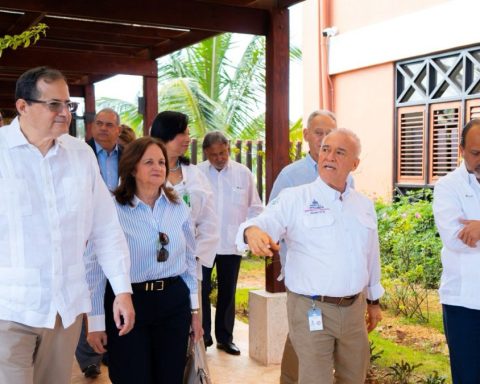For decades, Carabineros was one of the most prestigious institutions in Chile. However, in recent years, it has lost that category due to corruption cases and complaints of excessive use of force.
Among the cases of excessive use of force, in recent history, the one that occurred in 2015 stands out, after a policeman left the student Rodrigo Avilés in a coma after throwing pressurized water at him from an armored truck or “guanaco”, during a Demonstration for education in Valparaíso.
A year later, the fraud known as “Pacogate” broke out, alluding to the colloquial name (“paco”) by which the Chilean police are known and the American political scandal “Watergate”. The “Pacogate” is considered the largest economic fraud in the history of our country and has more than 130 people charged, including important former members of the High Command of the uniformed police.
Also known as “megafraud” in Carabineros, it began to operate in 2006, although it was only known in 2016, although some point out that the formulas for diverting resources date from the late 1980s. Its last splinters damaged the institution again, on March 17 just last year, when the Supreme Court unanimously rejected a request for annulment of a judicial sentence or an appeal for cassation and confirmed the ruling that convicted an officer (r) for fraud in the treasury. This is former Lieutenant Guillermo Benítez, sentenced to 541 days in prison and involved in a “maneuver” to establish a premium on the value of the police dogs with which he worked in the canine unit of the institution.
Subsequently, on March 27, the Santiago Court of Appeals accepted a lawsuit against another of those convicted of embezzlement of public funds. Retired sergeant José Alberto León, who is also being investigated as a co-perpetrator of the crime of money laundering and sentenced to pay the treasury a sum of more than 200 million pesos.
It is worth mentioning that, at the beginning of 2020, the total amount of the “megafraud” was valued at more than 35 billion pesos, being designated as the “largest case of corruption” that occurred during the validity of the criminal procedure system that began in the year 2000. In total, 132 people have been formalized in the case, both civilians and members of the institution, including former members of the High Command of the institution, such as the former General Director of the Carabineros Eduardo Gordon.
Fraud in the Canine Training School
The highest court in the country unanimously rejected the appeals filed by the defense of the sentenced Guillermo Alfonso Benítez Paredes, against the sentence that sentenced him to 541 days in prison, with the benefit of conditional remission of the sentence for a term of two years. , as the author of the crime of tax fraud. The crime was committed between 2009 and 2011, at the Carabineros Canine Training School.
In accordance with failure, in those years two civil servants, one of the rank of lieutenant colonel of Carabineros and the other of the rank of lieutenant, both of the endowment of the aforementioned Canine Training School, the first of them exercising the position of director and the second as chief of the Commission for the Acquisition of Fiscal Canes of the aforementioned establishment, agreed to defraud the treasury. They used the “direct deal” procurement modality, based on technical reports issued by the noted Carabineros lieutenant colonel to circumvent the regulatory bidding rules of the public procurement portal. Its operations consisted of agreeing with formal and informal suppliers of canine specimens the values of the dogs that were acquired for the institution with an excess value compared to the market sale prices. According to the expert reports prepared by the Criminal Organizations Investigation Department of the Carabineros (OS-9) and the Criminalistics Laboratory of the Investigative Police (PDI), the invoiced operations total $101,209,500, causing patrimonial damage to the treasury ( Police of Chile) for the sum of $17,073,354.
Sentenced to pay more than 200 million
The Santiago Court of Appeals accepted a civil lawsuit filed by the prosecutor against José Alberto León Cisterna, a retired Carabineros sergeant, convicted as the perpetrator of the consummated crime of embezzlement of public funds and as co-perpetrator of the crime of money laundering . The crimes were committed between December 2011 and December 2012. Also unanimously, the appellate court revoked the appealed ruling, handed down by the Fifth Civil Court of Santiago, upheld the claim and ordered León Cisterna to pay the treasury the amount of $225,529,406. The amount is equivalent to what was paid into his current account.
According to failure“no evidence has been provided, both to justify that the value appropriated by the defendant would be equivalent only to the lower amount that he would have actually received as payment for his services as front man for other higher links in the chain of fraud for which he was condemned”.
“On this point, although it was established that León Cisterna received the sum equivalent to the 12 deposits detailed in the criminal ruling, and that a commission was deducted from that sum before redistributing or reimbursing to third parties most of what was thus appropriated, the The damage for the plaintiff is equivalent to the diverted public funds and not the benefit that this particular co-perpetrator of the crime of embezzlement and money laundering could obtain from it,” the ruling concludes.
Impact of “Pacogate”
“Pacogate” had a negative impact on the public’s perception of the police force. According to the Cadem survey, Carabineros went from having a 77% positive evaluation in February 2017 to 52% in July of the same year. For its part, the CEP survey indicates that the positive evaluation of the institution dropped from 54% in January 2017 to 37% in June of that year. As of 2018, the image of the institution continued to be damaged, also adding the effects of the so-called “Operation Hurricane”.
As a result of both the “Pacogate” case and the “Operation Hurricane” scandal and the subsequent crisis in the Carabineros, in March 2018 a renovation was carried out in the High Command of the institution. In total, there were 15 generals who were retired by decision of the then General Director Hermes Soto.
Former director general Mario Rozas, who assumed said position after the removal of Hermes Soto for the murder of Camilo Catrillanca, stated in January 2019 that the crisis occurred “for not controlling, for not observing what is happening in our environment. For believing us self-sufficient and not observe what was happening around us”, adding that “the only way out of this crisis is by listening to criticism and assuming blame, because we must assume that we were arrogant as an institution”.
The discredit of the Carabineros reached its peak during the 2019 riots that left thousands injured, numerous people with eye damage, and in which context complaints were made against the uniformed force for “generalized violations” of human rights by the United Nations and other international organizations.
Among those who questioned the repression of those popular demonstrations was the then deputy Gabriel Boric and some of the members who would later make up his government, a situation that the UDI recently reminded him of during the legislative debate, demanding once again that they apologize to the uniformed police for your criticism.
The future of the controversial Carabineros de Chile institution, a police force involved in corruption scandals and cases of human rights violations, is a permanent point of conflict between the government coalition –which is committed to reforming the institution– and the opposition conservative –which puts obstacles to the possibility of reforming it–.
A struggle that has once again been placed at the center of the political debate after the death, in just fifteen days, of two policemen in routine procedures, despite the fact that President Gabriel Boric asked the parties to avoid politicizing security, the main concern of Chileans according to the Cadem and Ipsos surveys.
The rise in controversy has also coincided with the publication of Amnesty International’s annual report, in which the organization for the defense of human rights described as “worrying” both the permanence in his position of the current general director of the Carabineros, Ricardo Yáñez –considering that he is currently being investigated for the crime of omission due to “illegitimate coercion” during the outbreak–, as well as the lack of progress in the aforementioned reform of the police force, one of the President’s campaign promises.
In this tense context, Congress agreed to approve seven security projects, “hot legislation” -according to international experts, the Government and the parliamentarians themselves- promoted by Juan Antonio Coloma, president of the Senate and member of the Independent Democratic Union (UDI). , initiatives among which is the so-called Naín-Retamal Law.

















